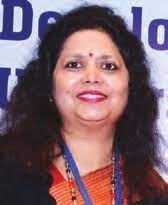
Selected Publications of Prof. Mona Khare on Higher Education in India
India’s NEP 2020 Goal of 6% GDP on Education: Alternate Scenarios for Post Covid-19 Pandemic by Mona Khare and Sandhya Dube
Abstract
In the midst of the pandemic triggered chaos and uncertainties, the much-awaited National Education Policy (NEP) of India was officially announced at the end of July 2020. The policy calls for “substantial investment in education and reiterates Government’s commitment to increase public expenditure on education to at least 6% of GDP. Under the current situation of a long term dampening effect of the economic recession arising out of the pandemic, the possibility of meeting the 6% target looks bleak.
The study aims at exploring the prospects of realising this goal in the days to come by empirically analyzing the relationship between economic growth and public expenditure on education in the country. It further analyses the alternative pathways of gradualism and shock therapy for attaining 6 percent GDP’s share to education based on a scenario building exercise. The findings reveal that given the pandemic steered recession, India will not be able to realise the 6 percent goal in the coming one and a half decade. The paper proposes that the government must seriously consider ‘mixed S-G’ approach — a combined strategy of ‘gradualism in the long run following shock in immediate future’.
Readers are advised to refer original publications and given complete reference of the material used.
Employment and Employability of Higher Education Graduates: What Indian Employers Have To Say by Prof. Mona Khare
Major Findings
Improving the employability and job preparedness of graduates is certainly important for both – the higher education sector and the industry sector and there is no shying away from responsibilities to that effect on the part of either. The unparalleled demand for higher and professional education in the country led to rather haphazard and unsystematic growth in this sub sector of education, with virtually no planning.
Most of the institutions in the country, failed to keep pace with the latest developments in basic disciplines, knowledge and technology. Outdated curriculum, institutional apathy, faculty resistance to change and adapt, poor governance and quality control, infrastructural bottlenecks can all be held responsible in some measure or the other for the rising discontent of the employer community with the kind of graduates coming out of HEIs.
More importantly, these problems plague the general education sub sector more acutely, the one that has a major share in India’s higher education enrolments and educated job seekers. This has serious ramifications not only for the current but also future growth of the country as more and more unemployable educated youth coming out of such a system will be more of a burden
The framework for sustainable graduate employability that emerges (figure above) is a maze of activities and institutional involvements providing mutual flexibility for flow of students, teachers, industry personnel – entry, exit and re-entry between multiple stakeholders/agencies — HEIs, Industries, training institutes, community participation. While HE has to play a pivotal role in establishing and strengthening this four pronged connectivity at local, national and global level, it is a shared responsibility of all stakeholders and likely beneficiaries.
To be proactive and not just responsive to support the HEIs in effective delivery of the learning as per the new demand of the global economy. Three major areas of Policy Intervention that emerge are, Connecting Skill Mapping Agencies and HEIs; Supporting HEIs for Formalizing Sustained Industry-academia linkages and Incentivizing Industry for mandatory involvement in HE sector.
Full Article: Employment and Employability of Higher Education Graduates by Prof. Mona Khare
Readers are advised to refer original publications and given complete reference of the material used.
Industries of the Future and its Human Resources in India by Prof. Mona Khare
Brief
The new wave of linking ‘education to work’, resultant from emerging labor market needs, evidences of higher salaries (income elasticity of higher education is higher than all other levels of education), and better-quality jobs with rising ‘skills hierarchy’ from primary to tertiary levels [1–4], has been evident in global education literature in the past decade. The labor market has seen a wide ranging transformation the first industrial revolution of mechanization (first age in 1780s) to electrification (second age of 1870) to automation (third age) to today’s Industry 4.0 age of digitization.
Industry is foreseen to move towards the 5.0 revolution of personalization where human-centric production is customized with greater cooperation between man and machine. The pace of industrial revolution 4.0 (Industry 4.0) has been unprecedented for both employers and suppliers of labor (human resources), challenged by the conundrum of ‘skills deficit’. Issues and means of automation, digitalization, big data management, environment sustainability are redefining the existing nature of work technology in both traditional and emerging industries of the future.
The described Industry 4.0 consists of four business industries projected for explosive growth – artificial intelligence (AI), robotics, machine learning, and blockchain. Another more important element needs to be added, that is coworking spaces aimed at cost efficiency and environmental sustainability. How these can be linked to the general production processes in major industrial sectors is what India is focused on.
Developing human resource for this new-age industrial transformation is a long-term, dynamic, and continuous process of skilling, de-skilling, and re-skilling for sustainable employability. Highly educated and specialized human resource to forge new innovations in production technologies and spearhead the new ‘knowledge economy’ are the needs of the future. These put India on its toes to review, rethink, and reorient its education, vocation
Full Article: Industries of the Future and Its Human Resources in India by Prof. Mona Khare
Profile of Prof. Moa Khare on Research Gate
Readers are advised to refer original publications and given complete reference of the material used.



